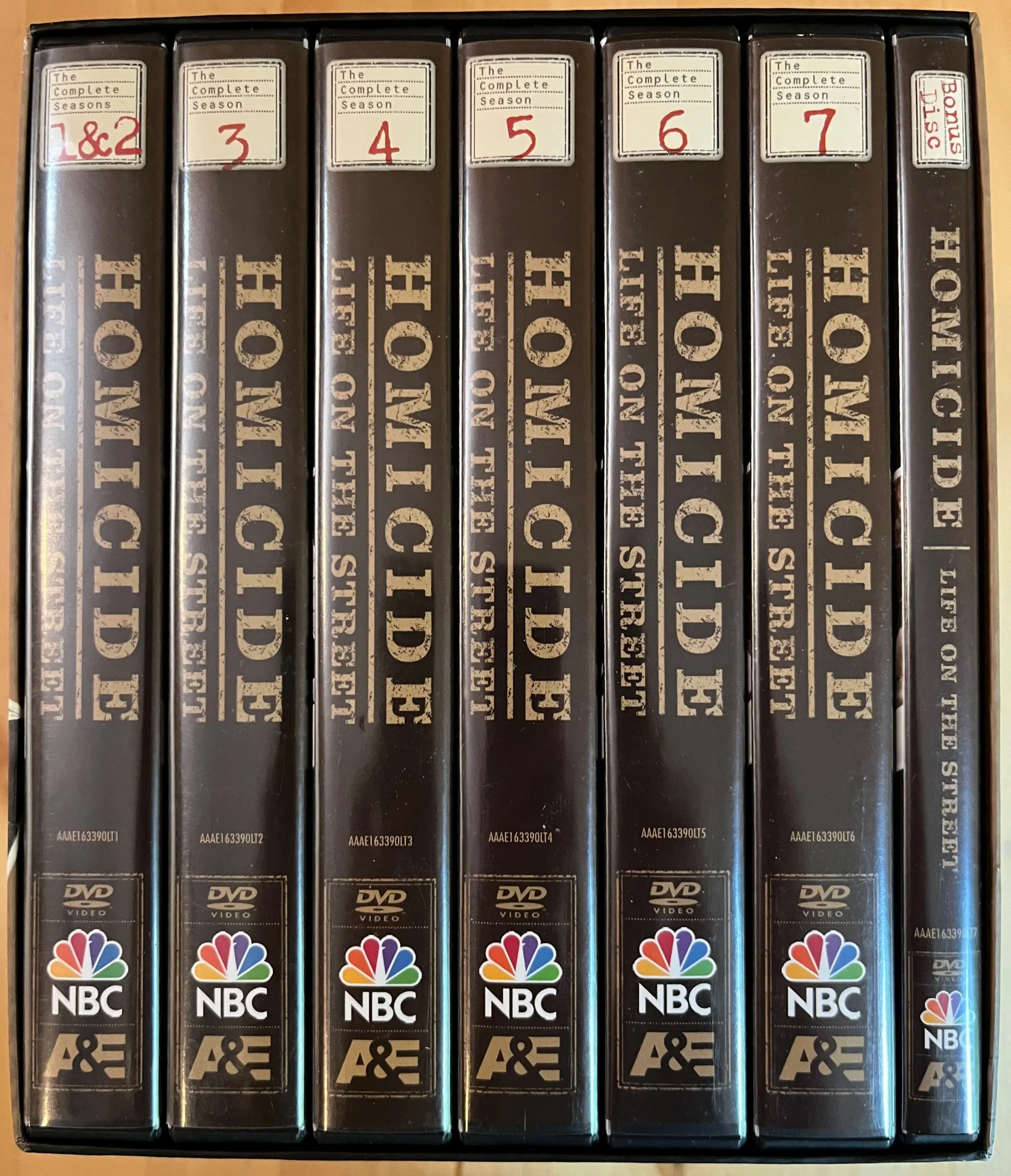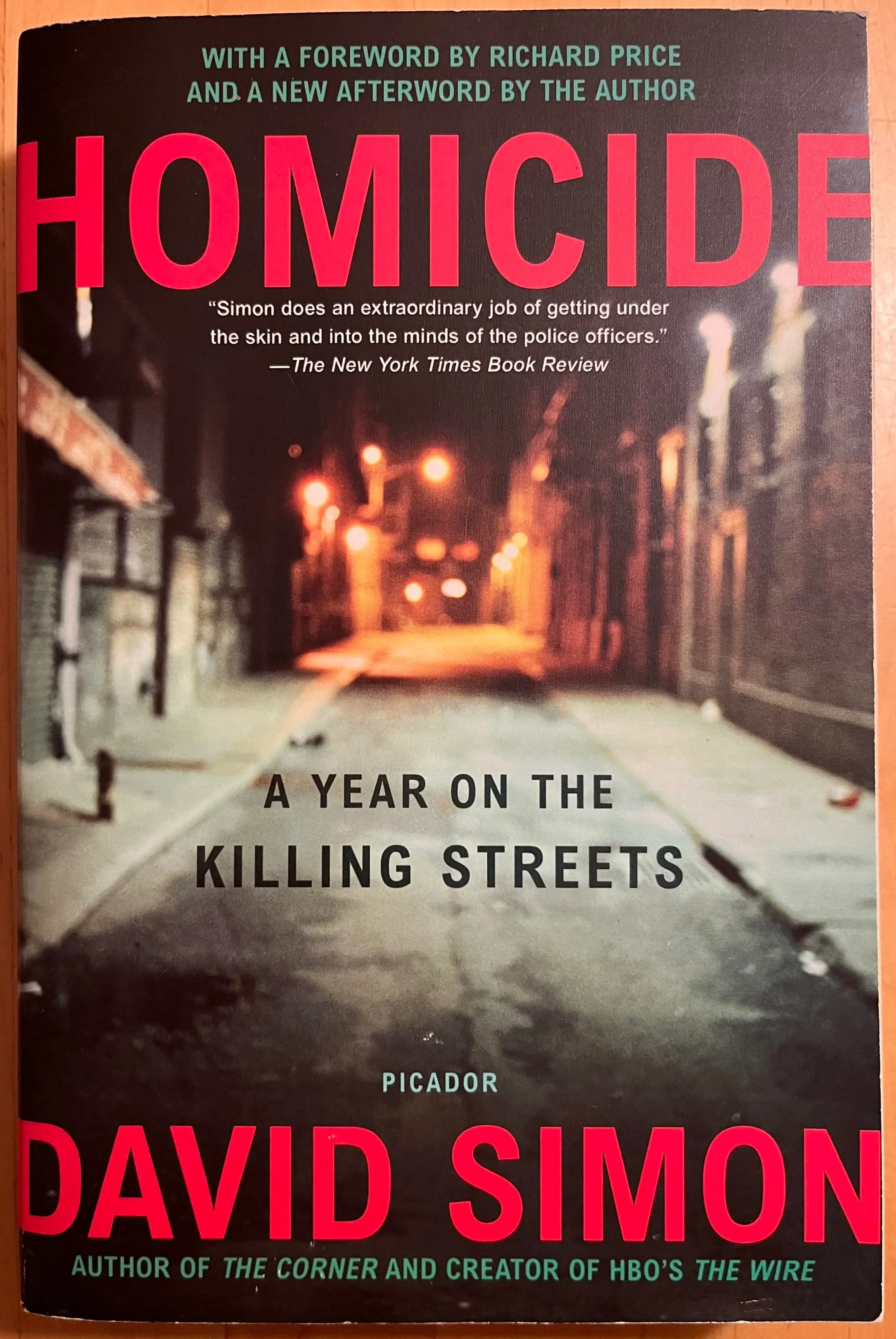The Serial Impact of Homicide: Life on the Street
Police procedural-“type” series still a paragon in storytelling
I recently sold my box set of Homicide: Life on the Street – The Complete Series. They were the last DVDs I was holding onto, but with nothing to play them on anymore, it was time. Selling the collection of outdated technology didn’t hurt, but like the guilt these Baltimore detectives carried over seven meaningful seasons, the pawning of this collection of stories weighed on me.
Maybe it’s because I enjoy solving a case—at home, at work, with writing—that the crime drama is more alluring than hospital soaps or fantasy fare. Maybe it’s because of my passion for Batman, the world’s greatest detective. Or maybe it’s because police procedurals feel more real. Homicide achieved exactly that by flipping the script, relying on an ensemble cast to fuel plot, not to eschew character development in favor of plot-driven potboilers. Here, it’s about the dead bodies but it’s not about the dead bodies: It’s really about the cops, their dead-end jobs, and the existential toll the job takes on them.
Homicide had grit. Liberal doses of bleak humor. That roster of diverse talent from Yaphet Kotto (Lt. Al Giardello) and Richard Belzer (Det. John Munch) to Andre Braugher (Det. Frank Pembleton) and Melissa Leo (Det./Sgt. Kay Howard). The on-location filming with handheld cameras, the jump cuts and repetitive shots—all very engaging, all revolutionary. Better not blink whenever we’re in “The Box” or you’ll miss the nuance. The show was progressive. In every scene. And remember, it was on NBC. Cigarette smoking was prevalent, stern language and adult situations as well, but no swearing or anything else, gratuitous or not, that we’re accustomed to from series on cable since Homicide raised the bar beyond the major networks.
It wasn’t until I’d rewatched the series a decade ago that I finally read the book it was based on. My quickie review: David Simon’s Homicide: A Year on the Killing Streets is on a short list of debuts that can be considered important, fiction or non. Yes, I’m a fan, but removing my bias, it’s a dense, different perspective on journalism in general and crime sagas more specifically. Unapologetic in tone, yet sympathetic toward detectives inured to the daily violence in Charm City.
This isn’t about which is better, as the book and the series can exist in their own beautiful spaces. But with both, connection to the characters propels you case by case, page by page, minute by minute. When partners head to a crime scene in a Chevy Cavalier and the chatter is on conspiracy theories or bible passages or family anecdotes, on anything but the soon-to-be-revealed “vic,” it resonates. A bunch of detectives in the breakroom discussing an open case, venting about work, or riffing on life’s anomalies is relatable. Action in the dialogue. Some themes, whether casual or quirky or serious, span multiple episodes, even years.
Evolution is often best served as a slow burn.
The year Simon spent shadowing one shift in the Baltimore Homicide Unit is a classic example of someone converting on a unique opportunity and then multiplying the success. From conception to execution to finished product, his vision of Homicide was clear and imaginative. His experience there led to The Wire, a progression of the blueprint minus network limitations. Grittier, grimmer, with dynamic and efficient storytelling, I understand why it’s at or near the top of lists of greatest shows ever. Five glorious seasons, a good length before a series tends to get stale…but nothing gets stale when David Simon is involved.
To promote the release of the series on Peacock in 2024, Reed Diamond (Det./P.I. Mike Kellerman) and Kyle Secor (Det. Tim Bayliss) partnered up for the Homicide: Life on Repeat podcast. In short, they rewatch the episodes in order and discuss each in fine detail. Smart conversations about a smart show. With behind-the-scenes stuff and guests from in front of the camera or behind, it’s a field day for devout followers. And speaking of geeking out, I worked on an indie film with Peter Gerety (Ofc./Det./Lt. Stuart Gharty), but helping Andre Braugher find hiking boots while I was an employee at Campmor wins. Other people have fun stories to share, no doubt, but this podcast fills a void.
Unfortunately, Homicide’s final five seasons aired on Friday night, a timeslot chasm, and the show never garnered the ratings it deserved. Fortunately, I was in college and then toiling in retail, so the TV, chiefly NBC in the ’90s, was a nightly ritual. What’s more, my mind was processing creative thoughts to figure out the types of writing that appealed to me most, and Homicide made sense to me on several levels.
With such a large canvas, balance is critical for viewer comprehension as well as overall look and feel. All the juggling is a not insignificant feat, a piece of the equation that adds to the storytelling like quality acting or editing can. But it’s the writing, which seemingly treated actor turnover not as a detriment but as an opportunity, that starts everything and binds you to the characters, even in their darker times. You root for them in life, you root for them to close cases—or, in Homicide parlance, to turn names on “The Board” from red to black.
In a manner of speaking, that’s what I’m going to do right now.

